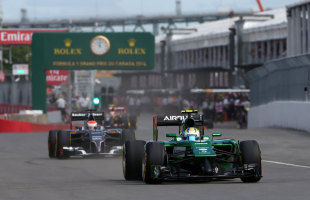
By now you will have read the news that 2015 is likely to look rather different, with only one evening practice session on a Friday. Grand prix weekends will be three days long, and not the present four. But if we're going to reshape the weekend in order to bring the costs down, why stop at just one practice session?
Moving the media day to Friday mornings might look like a good idea in theory, but really it's a great way to reduce Formula One coverage both online and in print. Interviewing the drivers before FP1 on Friday afternoons would mean that journalists would have two or three hours in which to get and transcribe quotes, turn them into stories, and get them published.
That in itself isn't a problem. But when it comes to traffic, there would be a very short window in which stories using current quotes to reflect on the previous weekend - like Lewis and Nico deciding they're best buddies again - would be relevant.
There is a certain ebb and flow to F1 news coverage, after all. Thursday is about reflecting on the past and hoping for the future, and your news aggregator of choice will be filled with Sergio Perez talking about updates to his car, or Sebastian Vettel explaining just how he managed to climb seven places in the first five laps of the previous grand prix.
As soon as the on-track action kicks off those stories are history, and it's all about who went fastest and who fell off.
Combining both days might not seem like a big deal from the perspective of a consumer of news, but given that traffic and circulation are what drive profits in media, any loss of traffic is likely to lead to a decline in the number of journalists covering the sport, and a decline in the amount of coverage Formula One gets.
But there is a solution. Make Friday the media day, run a three-hour practice session on Saturday mornings, and keep the rest of the weekend as-is. The three-day weekend will reduce hotel and travel costs for teams, while spectators will no longer need to take time off work to attend a full race weekend. In theory, that plus the reduced ticket costs that should stem from a shorter weekend would see an increase in ticket sales.
The only losers in such a scenario are the circuit owners, who rely on income generated from over-inflated ticket prices. But with a shorter weekend, the commercial rights holder would have to reassess the race hosting fees, and we could even find ourselves in the position of making the sport financially sustainable for all stakeholders: teams, circuits, media both print and broadcast, the commercial rights holder, and the FIA.
A girl can dream, can't she?

